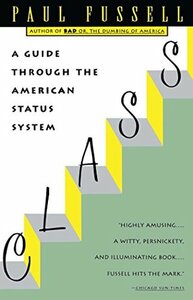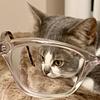Take a photo of a barcode or cover
Amusing and insigtning if not a little insulting, but hey I'm just a high prole
Biting and hilarious, and relevant to this day. Shocking how little has changed in 30 years. The actual social signifiers may be different, the underlying observation rings true. And alas, the more upsetting one finds this book, the more probably one is Middle Class.
DNF. The description says "Based on careful research and told with grace and wit..." which as far as I can determine is—lies.
I was really interested in this book, it came highly recommend, but I can't fathom why. I made it through the first chapter and a half before starting to skip around, looking to see if the subject developed or the tone changed—it didn't. It actually got worse. After some mildly interesting points in chapter one, this book devolved into gleeful, mean-spirited, finger-pointing. Now I knew it was supposed to be satire when I picked it up, and I'm perfectly down for a little middle-class bashing, and taking my own lumps when they come, but this was vapid and not even very funny.
I was expecting some humor and light sociology, but the entire book seemed to consist of a list of very spesific things that earmarked the American middle class in the '80s. If there was any solid theory underpinning the book it might still be quite relevant now, but there wasn't so it just seems laughably dated. The last chapter is devoted to the author inventing an imaginary perfect "classless" class right down to explaining how they should decorate their living rooms. A perfect class which he then puts himself and his friends in. It's unbelievable.
I didn't even bother to donate this book. I just trashed it. There wasn't anything there worth reading.
I was really interested in this book, it came highly recommend, but I can't fathom why. I made it through the first chapter and a half before starting to skip around, looking to see if the subject developed or the tone changed—it didn't. It actually got worse. After some mildly interesting points in chapter one, this book devolved into gleeful, mean-spirited, finger-pointing. Now I knew it was supposed to be satire when I picked it up, and I'm perfectly down for a little middle-class bashing, and taking my own lumps when they come, but this was vapid and not even very funny.
I was expecting some humor and light sociology, but the entire book seemed to consist of a list of very spesific things that earmarked the American middle class in the '80s. If there was any solid theory underpinning the book it might still be quite relevant now, but there wasn't so it just seems laughably dated. The last chapter is devoted to the author inventing an imaginary perfect "classless" class right down to explaining how they should decorate their living rooms. A perfect class which he then puts himself and his friends in. It's unbelievable.
I didn't even bother to donate this book. I just trashed it. There wasn't anything there worth reading.
Someone, somewhere, mentioned this book as an example of a taxonomy of US social classes more detailed than the usual "middle class" discourse. So I grabbed it out of a little free library.
The first chapter was promising - there's an interesting parallel between Fussell's "high proles" (independent highly skilled craftspeople), and modern software developers. But the book quickly descends into chapter upon chapter of what was surely trenchant social commentary in 1983, but is now so dated that the jokes aren't even recognizable as jokes. Life is too short.
The first chapter was promising - there's an interesting parallel between Fussell's "high proles" (independent highly skilled craftspeople), and modern software developers. But the book quickly descends into chapter upon chapter of what was surely trenchant social commentary in 1983, but is now so dated that the jokes aren't even recognizable as jokes. Life is too short.
challenging
funny
informative
slow-paced
I expected a lot more social justice out of this, and that's not what I got at all. This is more in the line of David Brooks (or perhaps I should say David Brooks is in the line of this, since this book was published well before Brooks' works) - a work of sociology and observation.
And classism. Paul obviously is (or thinks he is) one of the upper classes in his nine-class system, because the writing is full of snobbery and disdain. Sure, the phenomena he describes are interesting, but any time he discusses anyone below upper-middle class, you can practically see him turning up his nose and saying "and this is what the lower classes do" with a disdainful sniff.
It's even hard for me to determine what is actually accurate about his observations, because this book was published in the early nineties. So much has changed in technology and society since Class was published that quite a bit of what Paul talks about doesn't apply to anyone anymore. I think my parents are upper middle by his definitions, but it's hard to tell because when I tried the judgement scale based on what's in their living room, Paul had me subtract two class points for not having visible ashtrays.
Some of it actually was interesting, though. A couple chapters (notably the one on dressing habits) helped me pinpoint some of the subconscious details you pick up on to judge a person's class. And even though it was hard to tell what was relevant when it came to media and home decor and the like, it was still an interesting (if not completely relevant) look at class indicators in the 80s/early 90s.
Class was not what I had expected or hoped for, and Paul is insufferably snobby, but I wouldn't say the book was bad. Irrelevant, maybe; classist, definitely; but at least entertaining to read.
And classism. Paul obviously is (or thinks he is) one of the upper classes in his nine-class system, because the writing is full of snobbery and disdain. Sure, the phenomena he describes are interesting, but any time he discusses anyone below upper-middle class, you can practically see him turning up his nose and saying "and this is what the lower classes do" with a disdainful sniff.
It's even hard for me to determine what is actually accurate about his observations, because this book was published in the early nineties. So much has changed in technology and society since Class was published that quite a bit of what Paul talks about doesn't apply to anyone anymore. I think my parents are upper middle by his definitions, but it's hard to tell because when I tried the judgement scale based on what's in their living room, Paul had me subtract two class points for not having visible ashtrays.
Some of it actually was interesting, though. A couple chapters (notably the one on dressing habits) helped me pinpoint some of the subconscious details you pick up on to judge a person's class. And even though it was hard to tell what was relevant when it came to media and home decor and the like, it was still an interesting (if not completely relevant) look at class indicators in the 80s/early 90s.
Class was not what I had expected or hoped for, and Paul is insufferably snobby, but I wouldn't say the book was bad. Irrelevant, maybe; classist, definitely; but at least entertaining to read.
The author takes on the American myth of social equality as he examines how our status or class is revealed by the things we do, say and own...houses, objects, speech, styles, intellect, etc...I didn't necessarily agree with all of his conclusions, but I enjoyed the read.
Insightful and hilarious, if a bit dated. I would love to read a new edition for 21st Century America.



